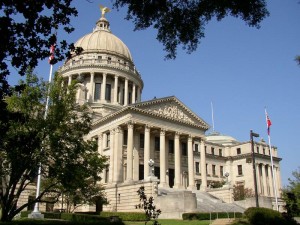It was all there in black and white: $935 million in state and federal taxes paid, and $4 billion in economic. That’s what Mississippi casinos achieved, despite two closures. “The  numbers reflect we’re doing OK here in Mississippi,” understated Mississippi Gaming & Hospitality Association Executive Director Larry Gregory. To help legislators make the case for the state’s casino industry against their more-prudish brethren, Gregory had this year’s report done in brochure form, highlighting facts like the staggering statistic that 71% of Mississippi’s 2.6 million visitors included a casino on their itinerary.
numbers reflect we’re doing OK here in Mississippi,” understated Mississippi Gaming & Hospitality Association Executive Director Larry Gregory. To help legislators make the case for the state’s casino industry against their more-prudish brethren, Gregory had this year’s report done in brochure form, highlighting facts like the staggering statistic that 71% of Mississippi’s 2.6 million visitors included a casino on their itinerary.
Mississippi posted its first casino-revenue increase since 2007, prompting Gregory to ask, “What other business in the state of Mississippi wouldn’t want those kind of numbers?” Casino gross revenue was $1.54 billion, with 70% of that derived from gambling. That statistic may shift a bit now that new casinos will be required by law to offer at least some form of non-gambling amenity, even if it’s a miniature golf course. Next step: Partner with Louisiana to market their casinos together.
* Atlantic City will have to get by on $400 million less. Revel‘s property tax assessment has been slashed — and we do mean slashed — from $625 million to $225 million. That’s an  even bigger step down from Revel’s initial assessment: $1.15 billion. We’re not saying Glenn Straub is getting a steal but the process of making Revel financially viable just got easier. Pointing out that Straub’s property tax bill will be more than double his purchase price, city spokesman Chris Filiciello justified the settlement in these terms: “such savings substantially benefit the debtors’ estates as well as any successor in interest who acquires”Revel.
even bigger step down from Revel’s initial assessment: $1.15 billion. We’re not saying Glenn Straub is getting a steal but the process of making Revel financially viable just got easier. Pointing out that Straub’s property tax bill will be more than double his purchase price, city spokesman Chris Filiciello justified the settlement in these terms: “such savings substantially benefit the debtors’ estates as well as any successor in interest who acquires”Revel.
Of course, if the Legislature approves the fixed-payment system being put forward by state Sens. Steve Sweeney and James Whelan, the current arrangement between Revel and the city is rendered moot.
* You’d think a new Strip megaresort had opened, to judge from the hoo-ha that accompanied the first White Castle in the desert Southwest, at Casino Royale (where else?). Customers from as far away as Phoenix were queuing up for the the damp, little burgers that have acquired an iconic  cachet. Even County Commissioner Chris Giunchigliani (D, left) turned out to flip burgers. Some intrepid (and hungry) LVA staffers went out at midday on the second day of business to try the sliders and returned in a state of fury. Seems that the burger joint was closed. All the customers storming the Castle were more than management was prepared to handle.
cachet. Even County Commissioner Chris Giunchigliani (D, left) turned out to flip burgers. Some intrepid (and hungry) LVA staffers went out at midday on the second day of business to try the sliders and returned in a state of fury. Seems that the burger joint was closed. All the customers storming the Castle were more than management was prepared to handle.
As workers were allowed “to catch their breath,” management tweeted, “due to overwhelming demand #WhiteCastleVegas is currently closed for maintenance and to restock. We will let you know when doors are reopen!” Service was down for three hours before reopening in midafternoon. The staff had good reason to be tuckered out and unprecedentedly bereft of supplies: No White Castle had sold so many burgers on an opening day … 4,000 in 12 hours, to the incredulity of White Castle Vice President of Government & Shareholder Relations Jamie Richardson. If you’re a White Castle fan there’s strong motivation you’d wait three hours for a meal: The alternative is to drive to Cape Girardeau, Missouri, not exactly a casual commute.


Ummm, isn’t that just Revel’s assessed value, not the actual tax bill?